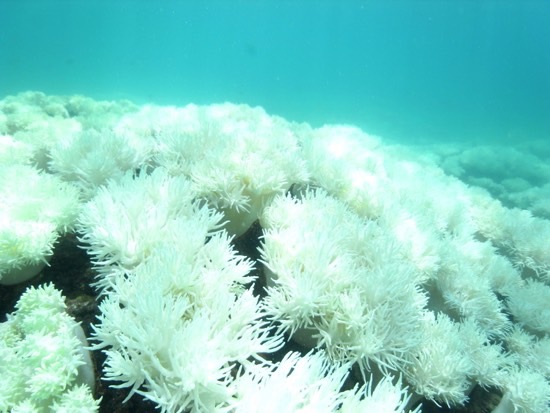
Yes, the catastrophic bleaching of the 2015-16 summer got some media attention and got a bit of playing down, too. But in some ways the 2016-17 summer has been worse for the reef. Not in what happened. But in what did not happen.
There has been no discernable recovery from 2015-16 and whole new areas have now been bleached. Moreover, soft corals are succumbing in greater numbers.
I am not a scientist and not a Great Barrier Reef expert. As a journalist, sailor and frequent diver and snorkeler, I can only report what I see and combine it with what I read and who I talk to.
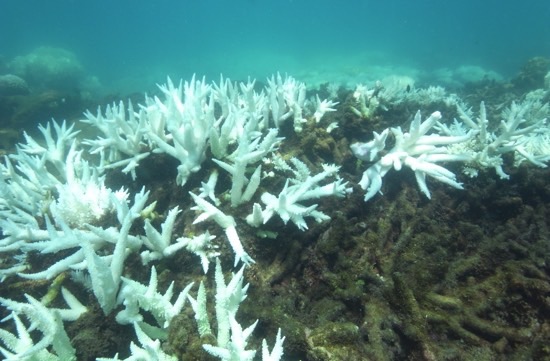
It is no longer news. “Yep, we have done coral bleaching on the reef. Next.”
Tourists are taken to places least affected so they feel the operator has given the tourist value for money. So the word goes south: “The reef looked okay to me.”
Vested interests play it down. Businesses that rely on the reef want business as usual. Politicians do not want to be blamed for their criminal inactivity.
People who go to the reef every day become like frogs in water that is slowly brought to the boil. An apt metaphor in this case. They do not notice the change until it is too late.
And scientists have a professional requirement to do their work quietly and dispassionately.
Ultimately, though, the 2300 km reef is worth $6.5 billion a year to the Australian economy (nearly all from tourism) and provides employment for 70,000 people in tourism, aquaculture, fishing and so on, mostly in tourism that is directly dependent on a healthy reef. We should be doing everything possible even if our action of climate change can only be a small contribution pat of the needed global action.
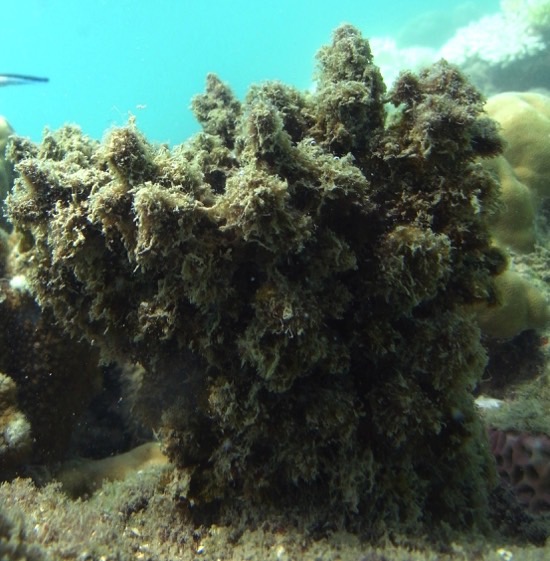
Given what is happening with climate change, it makes other action to help the reef that much more important. We must stop agricultural run-off of phosphates which promote the growth of the bad slimy algae that attack bleached coral. We must stop dredging run-off from ports that increase turbidity of the water to give coral any hope of recovering from bleaching .
We dive and or snorkel on the reef from our yacht and/or its dinghy about 10 to 15 times a year. Yes, I had seen the bleaching in 2016 on the outer reef between 20 and 30 kilometres offshore. I was appalled at the destruction of swathes of blue staghorn coral that was either white or covered in slimy algae. This coral is usually in sand away from the main reef, where not many people are taken. But there was a lot of plate, brain and cabbage-leaf coral on the main reef which had survived.
Maybe the combination of climate change with El Nino and fewer cyclones to well up colder water and lower rainfall to cool the top of the ocean was a perfect storm of destruction that would only happen in 2015-16 and that the reef could recover before such an event recurred and in time for climate change to be reversed.
I have to say that hope was dashed last weekend with a trip to the Low Isles, 13 kilometres off Port Douglas. It was calm, so we could go out to the eastern (windward) edge of the reef a fair distance from Low Isle itself where the reef seems to have escaped large bleaching and where the tourists quite reasonably are taken by the half dozen vessels which go there each day.
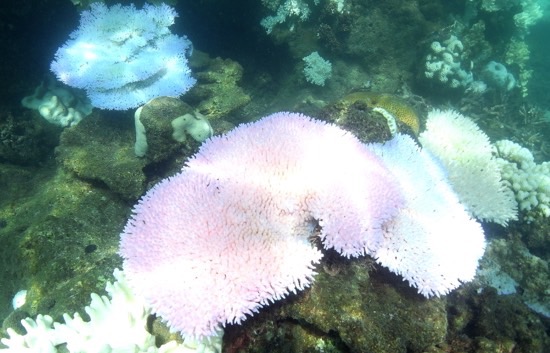
Hitherto, the dive or snorkel off the eastern edge of the reef off Low Isle was a gem if the visibility was good. The Low Isles have been a totally protected zone for more then 30 years and the high tourist numbers well managed. As a result fish life, turtles and reef sharks are abundant. But for how long? As we drove in the dinghy across the reef at mid-tide looking for the drop off, we could see that every bit of reef in water shallower than three metres was bleached. Under water it was bleached for as far as the eye could see.
It was as if a gang had gone into the Californian national park and ring-barked half the giant sequoia trees and governments and people said the gang’s coming back next year to ring-bark half of what’s left and we are doing nothing.
It is a if someone had gone out to the Serengeti and machine-gunned the wildebeests and said we are coming back next year to gun down the zebras, and no-one is going to do anything,
On the reef, last weekend it was a palpable contrast to vibrant colours I saw there two years ago. And what a palpable contrast to the first time I dived on the reef in 1985 with my then 14-year-old daughter who had just got her diving certificate. Alas, this is now no longer about the legacy we hand to our children and grand-children. At this rate, the reef is going to die in the lifetime of we grandparents.
There was no pleasure going under water last weekend. I was beyond even shock or anger. Tears welled up in my diving mask. So much bleaching, so little healthy surviving coral. It made me want to cry.
What, of what, have we done?
The rest is in the pictures: each a thousand words of shameful death warrant.
CRISPIN HULL
This article first appeared in The Canberra Times and other Fairfax Media on 11 March 2017.
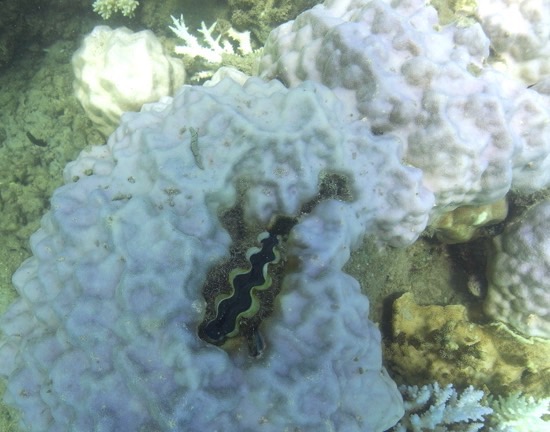
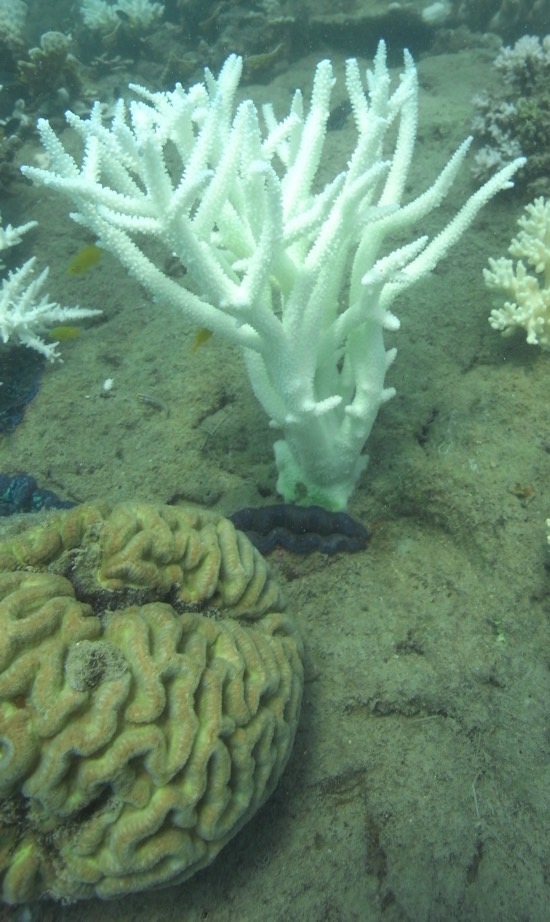
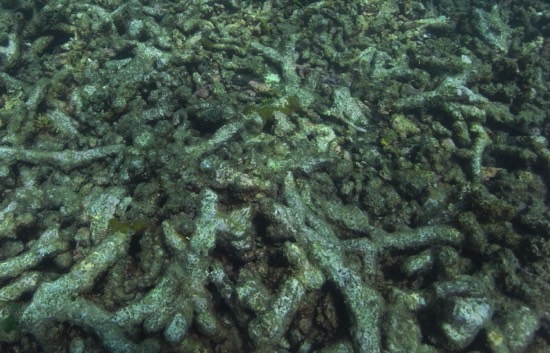
Yet Rupert Murdoch pays the so called journalists on the Outsiders program, on Sky News, global warming denialists, to advocate for the opening of the Adani Mine. Surely that is a criminal offence in itself!
David,
although I am not sure about the responsibility of these named companies, we know, that the industrial sector is responsible for the world wide death of nature – not only the Great Barrier Reef. The same happens in the rain forests of South America or Africa or … .
Our politicians only understand one word: “Election time”. It is our responsibility, to sack politicians, who are “in bed” with this industry. The only way is to support massively nature conservation NGOs and associated political parties to force politicians to revise their thinking.
What we do with our planet is a tragedy :-(.
Matthias
Ultimately, the real killers of the Reef are the “five faceless investors” who own most of Australia’s 20 biggest companies…HSBC, JP Morgan, National Nominees, Citicorp and BNP Paribas that between them dominate all sectors of industry that are fueling Climate Change!
Is the fate of the whole reef? Sadly Yes – it is the fate of the Reef as well as most of nature and wildlife on this planet that is facing extinction by the never ending and always expanding onslaught of mankind. The Reef is simply the canary in this coal mine called Planet Earth.
And we have no one else to blame but ourselves since like lemmings be lead over a cliff, we do nothing to stop the destruction. Why do we allow “governments with anti-environmental and pro-fossil fuel/profits at any cost behaviours”? Because we do not vote for anyone like the Greens who actually try to do anything about it. If the choice is only between Labour and Liberals, then it’s only about who gets the money from the destruction and not stopping it. The Reef is only dying because of those who are profiting from its demise.
Thankyou so much for capturing the despair I feel. I’m a boat skipper with two young kids, and the feeling that my generation is responsible for this atrocity is heavy on me. I wrack my brain for a way to change this, but find nothing. Are we so powerless?
It is almost too much to bear to hear yet again about the destruction of the fabulous reef and have to tolerate at the time seeing the resistance of certain groups towards resolving our terrible planetary environmental issues of this is one, and the support that these resistance groups (eg fossil fuel industry, pesticide and fertiliser industries) get from party politics and certain sections of the media. I like many others suffer from eco-depression as I do my bit to help but watch in despair as negative forces slow progress so much.
Whilst in Europe and elsewhere citizens see the effects of global warming in their shrinking glaciers and mid-winter heatwaves, and even in the Middle East with it’s sustained extreme summer heat, this is the first time we see the undeniable evidence in Australia. I really hope you can get the mainstream media to continue to bombard the public about this matter, every day, until we get genuine action and enough pressure to force our federal government to face up to the criminal negligence they are indulging in towards our environment. With 70% of Australians worried about global warming from the reports I read, it beggars belief that this government can get away with it’s anti-environmental and pro-fossil fuel/profits at any cost behaviours.
I pray for all life now.
Has anyone, scientist, marine biologist, drug companies…
has anyone figured out why
this is specifically happening yet?
We should go from there,
with respect and kindness
for all other life on this planet.
Let’s all march in the streets
for LIFE of the Planet
and all of us on it.
I, too, have sailed and snorkelled the Great Barrier Reef, mostly between Cardwell and Lady Musgrave Island, since the mid eighties, and I, too, have witnessed its degradation by being loved to death by too many tourists in some high use zones, smothering by sedimentary runoff in other places and the massive bleaching currently underway. I feel impotent to do anything effective in the face of the devastation I see. Thank you for speaking out.
Crispin, your eloquent and heartfelt description of this awful tragedy is the kind of writing that we can only hope will stir decision-makers from their lethargy. But I fear it may already be too late.
While you are beyond shock and anger, your sadness at the total destruction of what was a pristine reef comes through.
Stupidly it appears that instead of using Easter Island as a historical warning, mankind is using it as a blue print on a global scale.
As a fellow diver, parent and citizen of the globe, I wish you every success in alerting the world that, ironically, the death of the reef is our canary in the coal mine.